|
| | Losing history and culture quickly |    |
| | Author | Message |
|---|
Caro
Censura

Posts : 1522
Join date : 2012-01-09
 |  Subject: Losing history and culture quickly Subject: Losing history and culture quickly  Tue 26 Jun 2012, 23:49 Tue 26 Jun 2012, 23:49 | |
| Last year we spent a week in Malta and everywhere we went there were old yellow buses the Maltese were very proud of and which cranked us round, sometimes taking 90 minutes to get to Valetta, sometimes 30. And the fare varied every time. They had their own names and were owner-operated. We would make our way to the bus centre and there would be dozens of yellow, red and white buses to negotiate our way round. From Our Own CorrespondentMalta was very soon changing its buses since EU membership required a safer more modern fleet. This seemed a shame to us. The Maltese buses were on all the tourist postcards and mementos and on our table used every day are two little salt and pepper shakers in the shape and colour of Maltese buses. (My son rather anxiously asked if he would like such kitschy things when he was older; we were able to reassure about this.) But now a British company, Arriva, is running the Maltese buses. They changed last July, I think. Today he sent a text to say friends had been to Malta. There are new buses. There are no signs of the old buses, and they couldn’t find anyone to tell them where they could see one of the old buses. They seem to have been wiped out of Malta’s history . I know political embarrassments get wiped from countries’ consciousnesses – Japan is bringing back to its history books bits from the war it had ignored, the Turks seem to be able to insist Armenians were not killed in masses, and other little awkwardnesses are downgraded or made invisible, but I find this complete finito to the Malta buses odd and distressing. Are there other examples of this sort of thing that you know of? I see wikipedia lists 20 advantages to the new buses, but they don’t mention the disadvantage of losing an aspect of colourful history. |
|   | | nordmann
Nobiles Barbariæ

Posts : 7223
Join date : 2011-12-25
 |  Subject: Re: Losing history and culture quickly Subject: Re: Losing history and culture quickly  Wed 27 Jun 2012, 08:29 Wed 27 Jun 2012, 08:29 | |
| It can seem amazingly arbitrary and even a little horrifying how quickly things which would appear to be a fundamental facet of a community's culture and heritage can suddenly lose relevance and be consigned to history (and sometimes even forgotten by history just as quickly).
I'm sure everyone is familiar with that sensation when one suddenly notices a new building on a well-trodden high street which one regularly visits and despite racking one's brains cannot remember what stood there before. Often it can be surprising to find that some cherished landmark has disappeared to make way for the new and that you just never noticed its absence. |
|   | | Caro
Censura

Posts : 1522
Join date : 2012-01-09
 |  Subject: Re: Losing history and culture quickly Subject: Re: Losing history and culture quickly  Wed 27 Jun 2012, 23:13 Wed 27 Jun 2012, 23:13 | |
| I never remember anything of what has been a feature of a place earlier. Can't even remember what colour the room we painted was. I think that's because I don't really care about or notice surroundings much. I know things are different but not from what.
We went downtown (well, that's a misnomer now - there's no town in the centre) in Christchurch a while ago and my husband and his brother, very familiar with the city, couldn't really see that they were looking down the main street. They thought that's where it was, but there was nothing left of the physical look of the street - the shops and businesses - to give them any bearings. It was just a bare space with rubble to me, but to them it was a most disconcerting, jerking feeling, where they didn't recognise what had been second nature to them. I think they did remember what had been there, but without any of it, the scene was almost dystopian and very confusing. |
|   | | ferval
Censura

Posts : 2602
Join date : 2011-12-27
 |  Subject: Re: Losing history and culture quickly Subject: Re: Losing history and culture quickly  Wed 27 Jun 2012, 23:44 Wed 27 Jun 2012, 23:44 | |
| That's a very revealing instance of how we construct our mental representation of space and place, how we find our way, by the physical process of moving though it aided by the cues of the material structures overlaid with memory and association and how we can be utterly disorientated when we can't locate ourselves by reference to those patterns of movement and landmarks.
I'm sure I could find my way from place to place much more easily using something like the Tabula Peutingeriana than with a modern map, in fact the motorway maps where the places are laid out in sequence rather than in geographic relationship are rather like that, but that's perhaps my female tendency to poor spacial awareness. Maps are fascinating though, I can spend hours in the online National Library collection, not least in the way they demonstrate the changing concept of landscape and ownership.
|
|   | | Islanddawn
Censura

Posts : 2163
Join date : 2012-01-05
Location : Greece
 |  Subject: Re: Losing history and culture quickly Subject: Re: Losing history and culture quickly  Thu 28 Jun 2012, 04:48 Thu 28 Jun 2012, 04:48 | |
| Whilst change can be disconcerting, it is also part of the natural evolution. By witnessing change we are witnessing history.
There would have been a time when the old Maltese buses were a new addition to the island, and people were probably moaning at the change from donkey or whatever mode of transport that went before. Now the once new buses are seen as another tradition that has sadly been lost, and I wonder how many years it will be before this newer version of transport will be affectionately viewed as a quaint tradition? |
|   | | Nielsen
Triumviratus Rei Publicae Constituendae

Posts : 595
Join date : 2011-12-31
Location : Denmark
 |  Subject: Re: Losing history and culture quickly Subject: Re: Losing history and culture quickly  Thu 28 Jun 2012, 05:17 Thu 28 Jun 2012, 05:17 | |
| This is a special time where I am living, earlier on this year a Finnish ship sailed into and to some extent crushed the railway bridge over one of our fiords, thus excluding the rest of the country from rail transport with us.
The company that owns the grounds and station buildings had long ago planned that they were going to change rails and stuff over the summer and there were going to be heavy delays anyway.
The people dependent on public transport apparently now are getting used to buses (question as to how many s's are needed in busses?), and those among us weak at legs, operators of perambulators and rollators, or dependent on wheelchairs are raising questions as to why, as they are re-juvenating the stations anyway, they don't make access possible for us.
I mean how is, say, a mother going to get a pram with an infant inside hoisted up some four or five steps within a train?
The company claims that such a thing is not being done now as it isn't in the budget and wasn't planned, anyway.
One local mayor in a town have gone public, saying that she made objections to that problem back in the 1990'es.
So a good mud-slinging match is being had by everybody.
Those of us 'who know better', i.e. everybody not directly involved, shake our collective heads and are generally having a good time watching how the mud clings to some and not to others, remembering that next year this country is having local elections. |
|   | | Anglo-Norman
Consulatus

Posts : 278
Join date : 2012-04-24
 |  Subject: Re: Losing history and culture quickly Subject: Re: Losing history and culture quickly  Fri 29 Jun 2012, 11:23 Fri 29 Jun 2012, 11:23 | |
| The was something of a furore in Jersey a few years back. Made headline news locally, and the case even went before Privy Council. Janvrin's Farm, a well known 17th century farmhouse, had been scheduled for listed building status when it was abruptly purchased by a property developer and demolished (so abruptly that, IIRC, the gas hadn't even been turned off). The developer was successfully prosecuted by the States, but the judgement was overturned on appeal - because the farmhouse had only been scheduled for listing, not actually listed, he hadn't technically broken the law. I'd like to think the law has been changed and buildings under consideration for listing are now safe from development until a judgement has been made, but I'm not sure.
Elsewhere, many museums are struggling financially, not just because of the currently general financial situation, but because of cuts in funding (a significant proportion of the Heritage Lottery Fund has been diverted to the Olympics, for example).
Another round of regimental dissolutions and amalgamations are coming up, and once again the loss of the associated heritage is being lamented. Of course in this case it is an unavoidable side-effect of practical considerations (though whether the changes are necessary or even wise is much disputed!)
On a more positive note, other aspects are showing much better prospects. Some of the ancient offices, which would seem obsolete, are doing well - the Royal College of Arms, for example, is thriving and still churning out new Grants of Arms in addition to their other duties.
Some historic buildings which have not merited preservation in their existing form have, of course, found new leases of life. This hasn't always been done sympathetically, sadly, but often works well. Historic but redundant churches have been converted into community centres or museums; a surprising number have been turned into homes. In Jersey, the multiplicity of coastal defences have in numerous cases been revived. Several of the Round Towers (late 18th/early 19th century gun emplacements) have been incorporated into houses, whilst other defences are used as self-catering holiday cottages for hire - either proper conversions, or simple as 'stone tents'. One fort has been sympathetically converted into a house (with the dry moat now a lovely garden). The largest, the mighty Napoleonic-era Fort Regent, houses a leisure centre and concert hall. Even some of the German WWII defences have found a new life. Some have been restored as museums/heritages sites (the most famous being the War Tunnels, formerly known as the Underground Hospital), but some for more modern purposes - one observation tower is a weather station, one bunker an explosives store for fireworks, and so on.
So it's not all bad news. |
|   | | Priscilla
Censura

Posts : 2772
Join date : 2012-01-16
 |  Subject: Re: Losing history and culture quickly Subject: Re: Losing history and culture quickly  Sat 30 Jun 2012, 00:35 Sat 30 Jun 2012, 00:35 | |
| Shelley got it right in Ozymandias. Trying to preserve what is worthy of it is like trying to gather ball bearings scattered on glass. With a poll showing that half of UK youth think that Churchill is only a nodding dog selling insurance then you'll get my - and Shelley's -drift. As for places then it's nostalgia v worthiness of preservation. Life is layer cake as ferv knows in her science and we are ever in overload. Progress has given us the opportunity to record things in so many ways to counter loss but keeping pace is not easy and historians are having to move at a lick to do so.
Not sure if any of that makes sense -to someone else that is. |
|   | | Vizzer
Censura

Posts : 1851
Join date : 2012-05-12
 |  Subject: Re: Losing history and culture quickly Subject: Re: Losing history and culture quickly  Sun 19 Sep 2021, 17:28 Sun 19 Sep 2021, 17:28 | |
| - Caro wrote:
- Malta was very soon changing its buses since EU membership required a safer more modern fleet. This seemed a shame to us. The Maltese buses were on all the tourist postcards and mementos and on our table used every day are two little salt and pepper shakers in the shape and colour of Maltese buses. (My son rather anxiously asked if he would like such kitschy things when he was older; we were able to reassure about this.)
But now a British company, Arriva, is running the Maltese buses. They changed last July, I think. Today he sent a text to say friends had been to Malta. There are new buses. There are no signs of the old buses, and they couldn’t find anyone to tell them where they could see one of the old buses. They seem to have been wiped out of Malta’s history. 1968 was a pivotal year in London in this respect. It was the year in which the last Routemaster buses were bought by London Transport. The open-back bus, which had only entered service 14 years earlier in 1954 was the culmination of over 50 years of the evolution of double-decker motorbuses and trolleybuses which had first started to replace horse-drawn buses and trams in 1909. So robust and successful was the design of the Associated Equipment Company’s Routemaster that it continued to serve London Transport (i.e. only needing repaired and maintained, rather than replaced) for a further 37 years until the last one was retired in 2005. 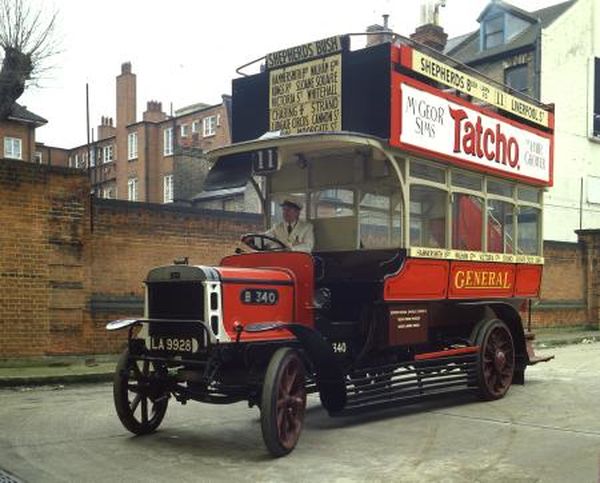 (An early London double-decker motorbus, the General Omnibus Company’s B-Type from 1911)  (AEC Routemaster buses still dominating London’s traffic in the 1990s) That said – there are still red double-decker buses in London today just maybe not so characterful. 1968 would also see the introduction of the Kiosk No.8 (K8) telephone box by the Post Office. This was the poor successor to the red telephone boxes K2 which had been introduced in the 1920s and K6 which had been introduced in the 1930s. They had been designed by architect Giles Gilbert Scott who had designed Liverpool's Anglican Cathedral and would go on design Battersea Power Station among other projects. The 1968 Kiosk 8 (not designed by Scott) was intended to replace those K2s and K6s which had reached the end of their technical lives mainly due to abuse and/or vandalism. K8, however, did nothing to deter vandals offering 3 large windows for them to smash whereas the K2 had comprised 54 panes of glass (3 sides of 18 panels each) while the K3 had no fewer than 72 panes of glass (3 sides of 24 panels each). The K8 also lacked the domed roof of the earlier designs and, being squared-off, was consequently less authoritative in appearance. Many of the K8s would be located in run-down or deprived areas and thus entered a downward spiral of vandalism and degradation during the 1970s. 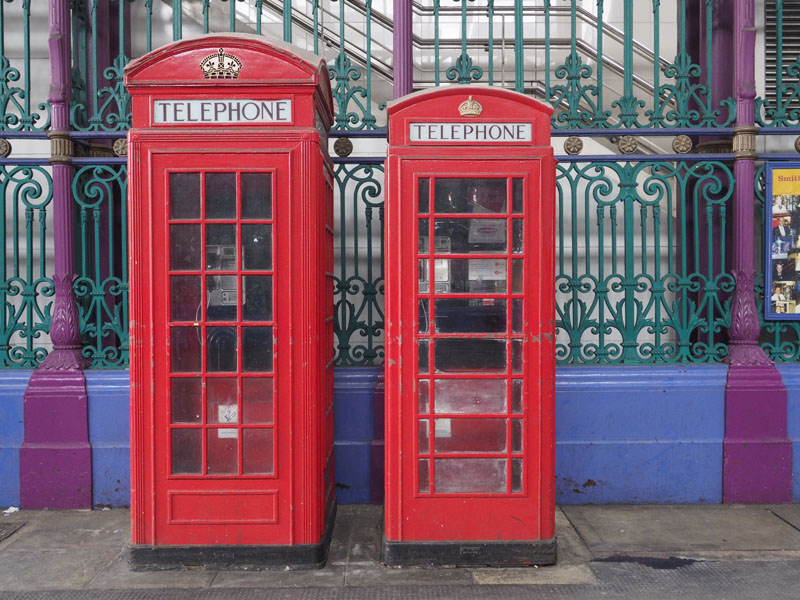 (A K2 telephone box on the left beside a smaller K6 telephone box outside Smithfield Market) 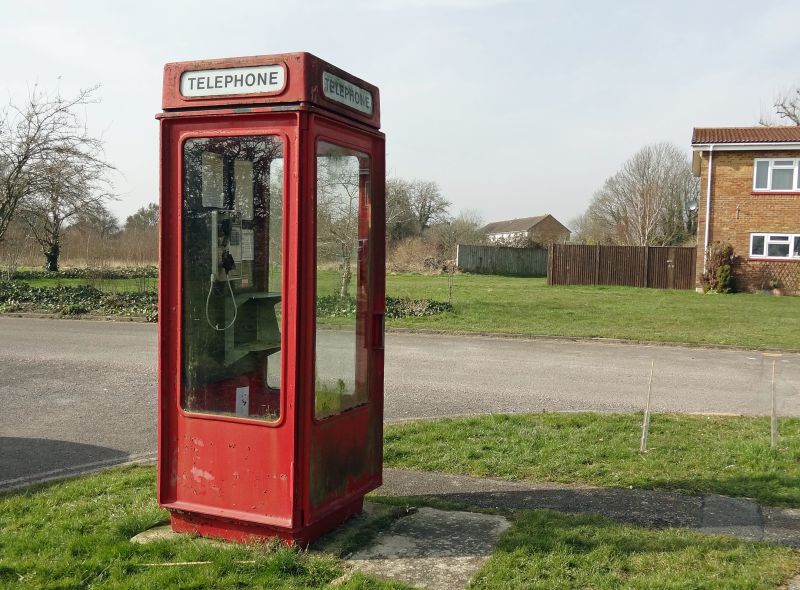 (A K8 telephone box 1968-1982) When Post Office Telephones were privatised in 1982 the new company, British Telecom, began abandoning red telephone boxes altogether in favour of unpainted stainless steel and glass (KX) phone boxes and unenclosed booths. Tens of thousands of red telephone boxes were replaced. Many people (myself included) didn’t really pay much attention to, or were bothered by, this change. Indeed, the KXs seemed a vast improvement on the K8s, for instance, with thicker and tuffer glass panels which much less prone to damage. It was only when relatives, friends and other visitors from overseas began expressing disappointment that there were hardly any ‘iconic’ red telephone boxes for them to see in London or elsewhere in Britain, that I (and many others) began to consider that, with the disappearance of the K2s and the K6s, then maybe something special had been lost.  (KX telephone boxes from the 1980s) 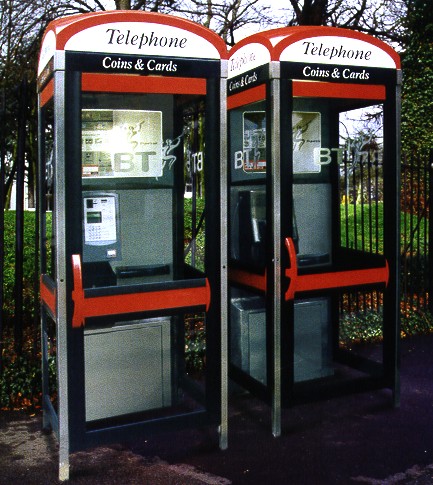 (KX+ telephone boxes from the 1990s – note the rather lame attempt at imitating the earlier kiosks by putting a plastic red dome on top) British Telecom also came to this realization. After having flogged off many K2s and K6s at next-to-nothing prices, they then rather sheepishly began trying to buy them back. Yet technology had moved on again and with the increasing use of mobile phones in the 1990s, fewer and fewer people needed to use telephone boxes of any design. After having reached a peak of over 70,000 red kiosks in Britain in the early 1980s, there are fewer than 8000 in public use today and many of those are largely aesthetic and/or symbolic. |
|   | | Meles meles
Censura

Posts : 5119
Join date : 2011-12-30
Location : Pyrénées-Orientales, France
 |  Subject: Re: Losing history and culture quickly Subject: Re: Losing history and culture quickly  Sun 19 Sep 2021, 19:28 Sun 19 Sep 2021, 19:28 | |
| A great many old telephone boxes have been repurposed and so preserved, at least for the time being, as defibulator stations, to such a degree that in some areas if suddenly confronted by an apparent heart attack, 999 emergency telephone responders might well tell you to go directly and find the nearest red telephone kiosk. However of course, as the years pass, there will be increasingly fewer people that actually know what a telephone kiosk might actually look like. 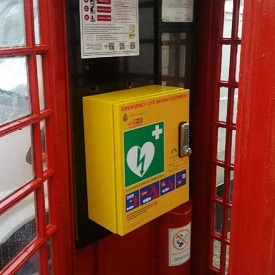 |
|   | | Caro
Censura

Posts : 1522
Join date : 2012-01-09
 |  Subject: Re: Losing history and culture quickly Subject: Re: Losing history and culture quickly  Sun 19 Sep 2021, 23:00 Sun 19 Sep 2021, 23:00 | |
| That's a very good idea. MM. We have defibulators but I wouldn't know where the nearest one was - not that it would be any use if I did since I wouldn't have any way of getting there now. I think many supermarkets and sports grounds have them.
Back to the Malta buses they may have long gone but we still have them as little salt and pepper containers on our kitchen table, used every day! I think I heard that the replacements didn't last long. Must check that. |
|   | | Caro
Censura

Posts : 1522
Join date : 2012-01-09
 |  Subject: Re: Losing history and culture quickly Subject: Re: Losing history and culture quickly  Sun 19 Sep 2021, 23:05 Sun 19 Sep 2021, 23:05 | |
| Following that, I now see that some of the old colours of the Malta buses are being used on tourist routes. |
|   | | Green George
Censura

Posts : 805
Join date : 2018-10-19
Location : Kingdom of Mercia
 |  Subject: Re: Losing history and culture quickly Subject: Re: Losing history and culture quickly  Sun 19 Sep 2021, 23:22 Sun 19 Sep 2021, 23:22 | |
| Ah yes. Routemaster (RM) buses and their predecessors. (RT, with preselector gearboxes) use to make periodic forays into Chelmsford in my day. They watched our Bristol/ECW Lodekkas go under the railway bridge at Duke Street, and think "If he can get through, I can". They couldn't. Particularly if coming from Springfied Rd, they stuck half way - there was a second, lower arch. Ours were 13'3" high, theirs were 13'9" (or some London Country green ones were 13'6". Still a crunch job). |
|   | | Priscilla
Censura

Posts : 2772
Join date : 2012-01-16
 |  Subject: Re: Losing history and culture quickly Subject: Re: Losing history and culture quickly  Sun 19 Sep 2021, 23:53 Sun 19 Sep 2021, 23:53 | |
| Gosh, yes, G.G, Thanks for thet. I'd forgotten about that place, I know it well. We had a similar one too and if the level crossing was closed some drivers chanced the low bridge. Their often getting stuck was greatly enjoyed by the locals and the local rag and it was also a good little earner for the nearby garage who cut off torn tops and let down tyres to get a bit of headroom which then probably needed replacing. |
|   | | Vizzer
Censura

Posts : 1851
Join date : 2012-05-12
 |  Subject: Re: Losing history and culture quickly Subject: Re: Losing history and culture quickly  Mon 20 Sep 2021, 17:14 Mon 20 Sep 2021, 17:14 | |
| - Meles meles wrote:
- However of course, as the years pass, there will be increasingly fewer people that actually know what a telephone kiosk might actually look like.
There's a similar phenomenon with regard to the advertising columns (colonnes Morris) in Paris. As a visitor having a particular expectation of the place, I distinctly got the impression on trips to Paris that the number of such columns seemed to decrease with each returning visit. To my mind they form an integral part of the Paris cityscape and that the city somehow feels less Parisian without them. Such advertising columns originated in Germany in the 1850s, where, by all accounts there are actually more of them than there are in France and especially in Berlin. For some reason, however, we in Britain tend to associate them with France and with Paris in particular. I've heard it said that their purpose was to serve as manhole covers whereby municipal workers with a key could unlock a panel in the side of a column, open it up and there would be located a fixed ladder on the inside thus affording easy access down into the sewer system. I haven’t, however, found any evidence to support this so it could literally be an urban myth. Some columns are attached to newspaper kiosks, some double as telephone booths while others even contained a pissoire which could be how the ‘manhole’ story originated.  (A Paris street scene by painter Jean Béraud c.1885)  (A Morris advertising column today) By all accounts these too are disappearing from the streets of Paris as we speak. |
|   | | Priscilla
Censura

Posts : 2772
Join date : 2012-01-16
 |  Subject: Re: Losing history and culture quickly Subject: Re: Losing history and culture quickly  Tue 21 Sep 2021, 19:02 Tue 21 Sep 2021, 19:02 | |
| The large Public clock is another thing on the way out, I suggest. If not the face movement, sometimes the chimes hare been removed. I miss them in places where I used to sit in parks and gardens, prompted by distant chimes; a rather comforting, secure noise to nudge you on. And there too, places that I have often glanced up to places almost without thinking to read the time show a bland wall with the stains of where a clock used to be. In railway stations an ever changing array of electronic timers have replaced the good old reliable station clocks. Is this really widespread? Is it progress? We seem to be gradually removing the very things that gave a place its own identity.... but does it matter? |
|   | | Priscilla
Censura

Posts : 2772
Join date : 2012-01-16
 |  Subject: Re: Losing history and culture quickly Subject: Re: Losing history and culture quickly  Tue 28 Sep 2021, 10:11 Tue 28 Sep 2021, 10:11 | |
| And another thing; we are losing many a landscape. Of course the familiar stooks of cut grain and hay stacks that for many an age covered our fields have long gone but other stuff is gradually becoming the norm. Wind turbines are on the march and now a lichen spread of solar glass is creeping in and in our area where once the special angus cattle and fields of flocks kept the meadows down to green plains, we have housing springing up like red triffid weeds almost over night; carefully crammed with small gardens and small twisty roads all samey yet no less private than many a workers' terraced row.
Sadly I see no sign of a quick growth of schools and clinics to sustain the life within. Alas also miles of hedges have long gone and banks where the primroses grew beneath catkins in spring. Why the houses could not have been built behind them I have no idea. It is possible too that the verdant network of useful linked ditches may be missed come cloud burst days.
I rejoice in the beauty that has been my joy to see in my lifetime and silently grieve for what is being lost and which those that follow me will never see. Perhaps, on the other hand, I just need a strong glass of port - or more Vit B, perhaps. |
|   | | Sponsored content
 |  Subject: Re: Losing history and culture quickly Subject: Re: Losing history and culture quickly  | |
| |
|   | | | | Losing history and culture quickly |    |
|
Similar topics |  |
|
| | Permissions in this forum: | You cannot reply to topics in this forum
| |
| |
| |
